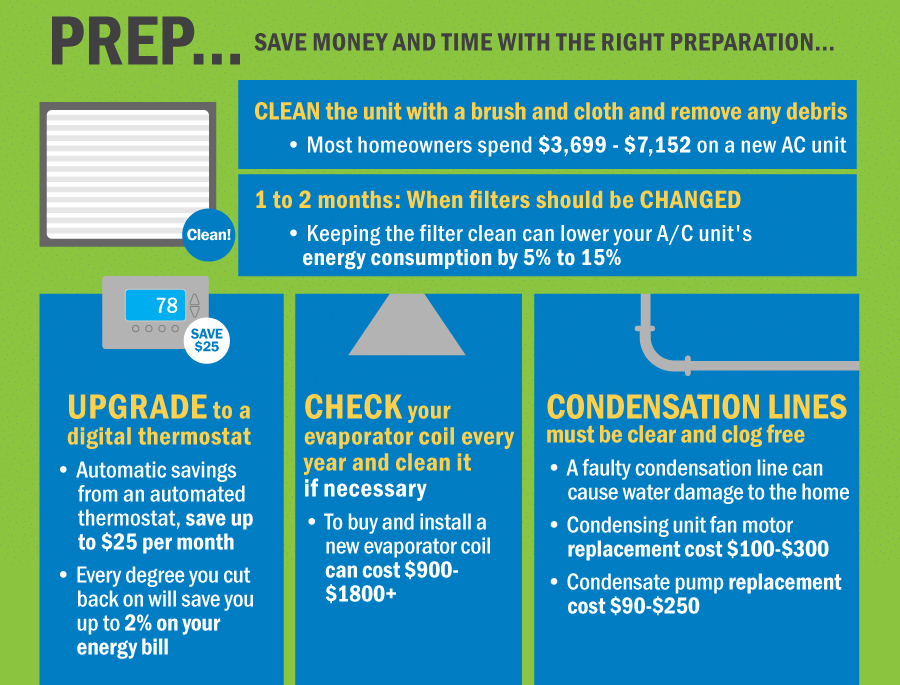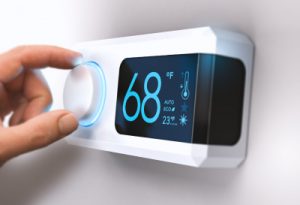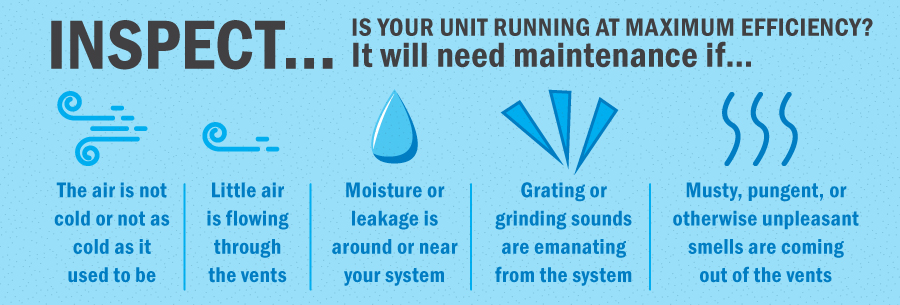How To Keep Your Central Air Conditioner Running Efficiently
AAA has over 50 years of experience with air conditioning units. We wanted to share what we know about keeping your system running efficiently. Air conditioners account for about 6 percent of the energy used in the United States, according to the Environmental Protection Agency. In addition to helping reduce harmful emissions into the atmosphere, running your central air conditioner efficiently can lower its energy consumption by up to 20 percent or more. Keeping your home comfortable and saving on your energy bills is as simple when you follow the tips below.
Maintain the Central Air Conditioner’s Filters
When you clean or replace the filter, you enhance the air conditioner’s efficiency by 5 to 15 percent. To increase A/C unit efficiency, filters should be cleaned or replaced regularly, per the manufacturer’s instructions. This will ensure its efficiency and increase its lifespan.
When dirt and debris clog a filter, air doesn’t flow through it as easily, which makes the unit work harder. Furthermore, when air flows through a dirty air filter it may carry debris with it, which could hinder the evaporator coil’s ability to absorb heat.

Keep the Area Around the Unit Clear
To help maximize your air conditioner’s efficiency, keep the area around the unit free of objects and foliage to increase airflow and keep its components clean.
When you place a large item behind a box fan, it can’t intake air as efficiently. The same concept is applicable to air conditioners. If you do have plants and shrubs around the unit, cut them back so they are at least 2 feet away.
Clean the Air Conditioner
When dirt and debris build up on the outer walls of a central air conditioner the airflow is reduced. Follow these simple tips to clean your air conditioner:
- Turn off the unit’s power.
- Remove any leaves, branches and debris in the unit’s condenser fins, the thin metal mesh on the outside of the A/C.
- Vacuum the fins using a soft-bristled brush attachment, taking care not to bend them.
- Remove the grill from the top of the A/C and vacuum around the motor.
- Wipe down the fan blades with a damp cloth.
Replace the Fuses
Prevent your air conditioner from failing by replacing the fuses every three months at the turn of each season.
It is best to let a professional replace the fuses, but if you are a handyman or handywoman, here are instructions for changing fuses yourself. Fuses are generally in the disconnect box, the small box near the A/C unit. To change the fuses:
- Turn off the unit’s circuit breaker.
- Remove the fuses from the disconnect box.
- Purchase new fuses. Take an old fuse with you to make sure you purchase the right type.
- Place the new fuses inside the disconnect box.
- Close the disconnect box.
- Turn on the unit’s circuit breaker.
Set the Right Temperature
While personal preferences differ, the ideal temperature setting for a central air conditioner is about 78 degrees Fahrenheit. For every degree that you raise the thermostat above 78 degrees while it’s on the cooling setting, you save up to 10 percent more on your cooling costs.
Efficiently cool your home by using ceiling fans set on the lowest setting to circulate cold air throughout your home. Doing this allows you to keep the temperature on the thermostat higher and put less pressure on the A/C to cool your home.

Use a Programmable Thermostat
You don’t need to keep the air in your home as cool when you’re not there. A programmable thermostat is a small investment that can help save you money because tell the air conditioner to cool the air at the right times of the day.
Adjust the Fan Setting
Central air conditioners have two fan settings on a thermostat: On and Auto. When you set the fan to On, the fan will blow all the time. Let the Auto setting take control for you and conserve energy by turning on the fan during cooling cycles only. This quick fix can save you up to $25 per month.
Schedule Professional Maintenance Every Year
Like a car, a central air conditioner is a big investment. Just as you take your car into the shop for a tune-up, you should have an HVAC contractor look at the unit every year.
When a professional services your air conditioner, they will make sure the various parts have sufficient lubrication and will make adjustments that will help increase the efficiency of your system. They will also let you know about minor problems that need attention before they become expensive repairs in the future.
Inspect Your Duct Work
A central air conditioner blows cool air through a series of ducts in your home. If one of the ducts has a leak, cool air will end up in parts of the house where it’s not needed, like inside the walls. Have a professional inspect your duct work every three to five years.
Follow the inspection with a professional duct cleaning service to remove dust and debris in the duct work that downgrade the quality of your indoor air. In some cases, a professional may recommend that you repair the ducts to increase the efficiency of your air conditioner.
Weatherize Your Home
Cool air can escape from several places in a home, such as electric outlets, under door cracks, single pane windows and through poorly insulated walls. Schedule a home energy audit to learn how you can tighten the building envelope and keep your cool air inside.
Stay Shady
When the sun enters through a window and heats a room, it can feel wonderful during the winter. In the summer, however, it can make your A/C work harder. When temperatures start to rise, keep your energy costs and heat gain low by shading your window with:
- Awnings on the exterior of your home.
- Trees that are a safe distance from your home. Trees will also help keep the ground around your home cooler.
- Blinds or solar shade screens on the windows. Keep the blinds or shades on the southern and western windows closed during hot afternoons.
- Blackout curtains. Like the blinds, keep the curtains closed on warm afternoons.
When installing a new central air conditioner, place it away from the dryer vent and on the north side of your home, in a shady spot. If your air conditioner is already in a sunny spot, purchase a cover to help block the sun’s heat.
Consider Replacing Your Central Air Conditioner
Sometimes the best thing you can do to maximize the efficiency of your A/C is purchase a new unit. This is particularly true when:
- The cooling unit is over 10 years old. New units with a high efficiency (SEER) rating of at least 13 are about 25 percent more efficient than their older counterparts and can save you up to 30 percent on your energy bill.
- The A/C frequently needs repairs.
- The central air conditioner does not cool your home evenly.
- Your energy bills steadily increase.
- It’s not the right size for your home. A unit that’s too big needlessly uses too much energy to cool your home and costs more to install. One that’s too small has to work harder to cool your home and may not dehumidify it well.
- Your unit uses the HCFC-22 or R-22 coolant, which is harmful to the environment and will become obsolete in the near future.
Keeping your home comfortable and saving energy is simple. If you have any questions about making your central air conditioner run more efficiently or purchasing a new cooling system, contact the experts at AAA Heating & Cooling today and check out our service and repair page. Have other HVAC needs? Read more about our residential experience here.
